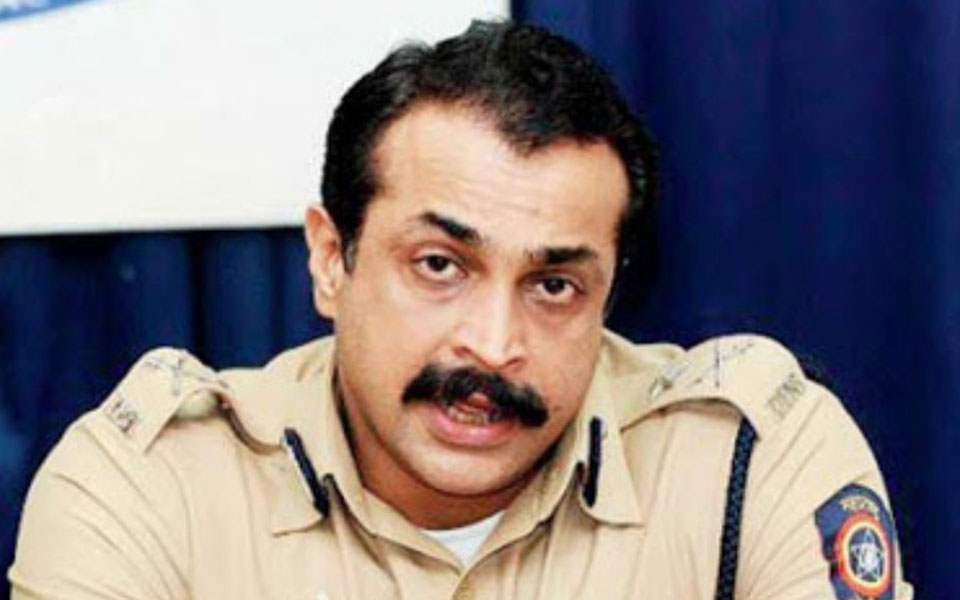Mumbai, May 11: Maharashtra's Additional Director General of Police Himanshu Roy, credited with directing investigations into several sensational crimes and high-profile cases, committed suicide by shooting himself in the head here on Friday afternoon.
Often referred to as 'Arnold Schwarzenegger' of Mumbai Police, the 54-year-old Roy shot himself in the mouth with his service revolver at his house in Suniti Apartments at Nariman Point shortly after 1 p.m., a police statement said.
He was rushed to the Bombay Hospital by family members and aides where he was declared dead.
A suicide note found in the house quoted Roy as saying that he was taking his life because he was disgusted with cancer, which he had been battling for some time.
Roy's suicide shocked the police community.
A 'Mumbai boy', Roy studied in the prestigious St. Xaviers College and became a Chartered Accountant. He cleared the UPSC exams to become an Indian Police Service (IPS) officer of the 1988 batch.
During his preparations for the UPSC exams in Mumbai, he met his future wife Bhawna, who subsequently became an IAS officer but quit the civil services to devote herself to social work through NGOs in Maharashtra.
A regular gym trainer and fitness enthusiast, Roy would animatedly discuss healthy lifestyle, his fitness regime, diets and related issues with policemen and journalists.
He was popular among his juniors and would regularly guide them on the finer aspects of crime investigation, linking evidence with criminals and presenting a winning case in courts.
Roy started his police career as Superintendent of Police (Rural) in Nashik and Ahmednagar. Later, he headed the Economic Offences Wing in Mumbai, was Deputy Commissioner of Police (Traffic) and also headed the Cyber Crime Cell.
As former Joint Police Commissioner (Crime) and chief of Anti Terrorist Squad (ATS), Roy was credited with directing the investigations into several sensational crimes.
These included the murder of journalist J. Dey. Besides, he directed the probe into the IPL match fixing and betting scams of 2013 in which several top cricketers and Bollywood actor Vindu Dara Singh were among the accused.
He was instrumental in solving the brutal murder of lawyer Pallavi Puryakayastha -- daughter of an IAS couple at the Centre -- at her Mumbai home in August 2012.
In 2012, he was among the officers handpicked by then Home Minister R.R. Patil to oversee the shifting from Mumbai to Pune of Pakistani terrorist Ajmal Kasab, found guilty in the Mumbai terror attack.
Again that year, he cracked the sensational killing of missing Bollywood starlet Laila Khan, who was murdered with five family members at an isolated countryhouse (farmhouse) in Nashik.
Roy oversaw the investigation into the August 2013 gang-rape of a woman photo-journalist inside the desolate Shakti Mills Compound in central Mumbai which culminated in death sentence for three of the accused.
Let the Truth be known. If you read VB and like VB, please be a VB Supporter and Help us deliver the Truth to one and all.
Panaji (PTI): As part of a crackdown against tourist establishments violating laws and safety norms in the aftermath of the Arpora fire tragedy, Goa authorities on Saturday sealed a renowned club at Vagator and revoked the fire department NOC of another club.
Cafe CO2 Goa, located on a cliff overlooking the Arabian Sea at Vagator beach in North Goa, was sealed. The move came two days after Goya Club, also in Vagator, was shut down for alleged violations of rules.
Elsewhere, campaigning for local body polls, AAP leader Arvind Kejriwal said the fire incident at Birch by Romeo Lane nightclub at Arpora, which claimed 25 lives on December 6, happened because the BJP government in the state was corrupt.
An inspection of Cafe CO2 Goa by a state government-appointed team revealed that the establishment, with a seating capacity of 250, did not possess a no-objection certificate (NOC) of the Fire and Emergency Services Department. The club, which sits atop Ozrant Cliff, also did not have structural stability, the team found.
The Fire and Emergency Services on Saturday also revoked the NOC issued to Diaz Pool Club and Bar at Anjuna as the fire extinguishers installed in the establishment were found to be inadequate, said divisional fire officer Shripad Gawas.
A notice was issued to Nitin Wadhwa, the partner of the club, he said in the order.
Campaigning at Chimbel village near Panaji in support of his party's Zilla Panchayat election candidate, Aam Aadmi Party leader Kejriwal said the nightclub fire at Arpora happened because of the "corruption of the Pramod Sawant-led state government."
"Why this fire incident happened? I read in the newspapers that the nightclub had no occupancy certificate, no building licence, no excise licence, no construction licence or trade licence. The entire club was illegal but still it was going on," he said.
"How could it go on? Couldn't Pramod Sawant or anyone else see it? I was told that hafta (bribe) was being paid," the former Delhi chief minister said.
A person can not work without bribing officials in the coastal state, Kejriwal said, alleging that officers, MLAs and even ministers are accepting bribes.





